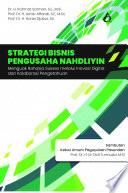A practical guide for robust sharī'ah governance ofthe Islamic banking industry Debate in the market on the extent of sharī'ahcompliance of Islamic banks, their products, and activities haspiqued stakeholders' interest. In Foundations of Sharī'ahGovernance of Islamic Banks, Karim Ginena and Azhar Hamidexplore the depths of sharī'ah governance to unravelits mysterious dimensions, and equip academics and practitionerswith a solid understanding of the subject, which has become aserious challenge and thus deserves dedicated attention. The authors make a strong case for the need to contain thesharī'ah risk that Islamic banks experience, andpresent a compelling argument for how this should be done. Ginenaand Hamid propose a robust sharī'ah governance modelthat comprehensively tackles thisrisk, and helps improve the extentof sharī'ah compliance of market players. The authorsdetail the internal, external, and institutional arrangementsneeded to promote responsible sharī'ah governance, andcritically analyze current laws, regulations, and industrypractices on the topic. The chapters of the book do thefollowing: Examine the roots, characteristics and objectives ofsharī'ah and its relation to financial dealings; Probe the role of regulators in sharī'ahgovernance, explore the different approaches adopted by bankingsupervisors, and provide examples of relevant legal and regulatorymeasures; Explain to bank directors and management the fiduciary dutythey assume with respect to sharī'ah compliance, anddetail how they could discharge this responsibility in line withbest practices; Elaborate on the purpose of the Sharī'ahSupervisory Board (SSB), its responsibilities, competence criteria,internal regulations, and key governance guidelines; additionally,they explore different SSB models; Describe the internal sharī'ah control systemincluding its six components, and examine the internalsharī'ah audit function as well as different stages ofconducting a sharī'ah audit; Clarify the role of a sharī'ah auditor, withguidance on reporting lines, scope of duties, authority, andpractical ways on fulfilling tasks, such as a samplesharī'ah risk assessment grid and auditchecklists; Discuss the newly emerging external sharī'ahadvisory firms that are expected to play a key role in the comingyears and the services they provide. Through an effective treatment of each of these elements, andthe way that they interact with one another, the book offers afresh take on how robust sharī'ah governance of Islamicbanks can be successfully accomplished. It is a comprehensiveresource for academics, regulators, directors, lawyers, auditors,consultants, employees, and customers of Islamic banks interestedin learning more about these challenges. This essential readingpersuasively extends the discourse on the subject and addressescritical sharī'ah issues that have policy implicationsfor decision makers in jurisdictions aiming to attract thefast-growing Islamic finance industry or increase their marketshare.
This book is an essential read for those who want to understand Islamic banking, and more so, for those engaged in the Islamic Banking industry anywhere in the world.










